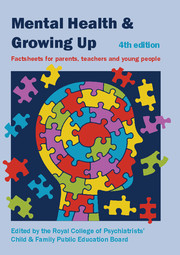Book contents
- Frontmatter
- Contents
- Contributors
- Factsheets for young people
- Factsheets for parents, carers and anyone who works with young people
- 1 Good parenting
- 2 The restless and excitable child
- 3 Dealing with tantrums
- 4 Children who soil or wet themselves
- 5 Sleep problems in childhood and adolescence
- 6 Behavioural problems and conduct disorder
- 7 Attention-deficit hyperactivity disorder (ADHD)
- 8 The child with general learning disability
- 9 Specific learning difficulties
- 10 Autism and Asperger syndrome
- 11 Depression in children
- 12 Worries and anxieties: helping children to cope
- 13 Divorce or separation of parents: the impact on children and adolescents
- 14 Death in the family: helping children to cope
- 15 The emotional cost of bullying
- 16 Traumatic stress in children
- 17 Domestic violence: its effects on children
- 18 Child abuse and neglect: the emotional effect
- 19 Drugs and alcohol: what parents need to know
- 20 Self-harm in young people
- 21 Psychosis
- 22 Schizophrenia
- 23 Bipolar disorder in children and adolescents
- 24 Obsessive–compulsive disorder in children and young people
- 25 Eating disorders in young people
- 26 Chronic physical illness: the effects on mental health
- 27 Medically unexplained physical symptoms
- 28 Chronic fatigue syndrome: helping your child get better
- 29 Parental mental illness: the problems for children
- 30 Who's who in CAMHS
11 - Depression in children
from Factsheets for parents, carers and anyone who works with young people
Published online by Cambridge University Press: 02 January 2018
- Frontmatter
- Contents
- Contributors
- Factsheets for young people
- Factsheets for parents, carers and anyone who works with young people
- 1 Good parenting
- 2 The restless and excitable child
- 3 Dealing with tantrums
- 4 Children who soil or wet themselves
- 5 Sleep problems in childhood and adolescence
- 6 Behavioural problems and conduct disorder
- 7 Attention-deficit hyperactivity disorder (ADHD)
- 8 The child with general learning disability
- 9 Specific learning difficulties
- 10 Autism and Asperger syndrome
- 11 Depression in children
- 12 Worries and anxieties: helping children to cope
- 13 Divorce or separation of parents: the impact on children and adolescents
- 14 Death in the family: helping children to cope
- 15 The emotional cost of bullying
- 16 Traumatic stress in children
- 17 Domestic violence: its effects on children
- 18 Child abuse and neglect: the emotional effect
- 19 Drugs and alcohol: what parents need to know
- 20 Self-harm in young people
- 21 Psychosis
- 22 Schizophrenia
- 23 Bipolar disorder in children and adolescents
- 24 Obsessive–compulsive disorder in children and young people
- 25 Eating disorders in young people
- 26 Chronic physical illness: the effects on mental health
- 27 Medically unexplained physical symptoms
- 28 Chronic fatigue syndrome: helping your child get better
- 29 Parental mental illness: the problems for children
- 30 Who's who in CAMHS
Summary
How common is depression?
Depression is thought to occur in around 1–3% of children and young people.
Anybody can have depression and it happens in people of all ages, races, income levels and educational levels. Teenage girls are twice as likely as teenage boys to be depressed.
What causes depression?
There is no specific cause for depression. It can be caused by a mixture of things, rather than any one thing alone. It may be triggered by stressful life events, for example bullying at school, parental separation or divorce, bereavement or conflicts with family members or friends. It can also run in families, especially if a parent has depression or a mood disorder such as bipolar disorder (also called ‘manic depression’).
What are the symptoms of depression?
When a child or young person is depressed many changes can be seen. They may:
• lose interest in activities that they enjoyed before
• lose their appetite or start overeating
• have problems with concentration, remembering things or making decisions
• self-harm or have thoughts of suicide
• have disturbed sleep or sleep far too much
• feel tired all the time, exhausted
• complain of aches and pains, for example headaches or tummy pains
• have little self-confidence
• express feelings of guilt for no reason.
In children, especially teenagers, being irritable and grumpy all the time can also be a symptom of depression, not just of being in a ‘bad mood’.
At the extreme end of depression, some young people can develop ‘psychotic symptoms’ – they may start to have very unusual and sometimes unpleasant thoughts and experiences.
Some children also have periods of high mood (also called ‘mania’) along with periods of low mood. This may mean they have bipolar mood disorder.
What effects can depression have on the young person?
A child or young person with depression can have major problems in not only how they feel, but also how they behave. This may cause difficulties at home, at school, as well as with relationships with family and friends. Some young people may try to cope with their problems by engaging in risky behaviours, such as self-harming (e.g. cutting), misusing drugs or alcohol, having inappropriate sexual relationships (leading to teen pregnancy in girls), dropping out of school, and, at the extreme end, suicide.
- Type
- Chapter
- Information
- Mental Health and Growing UpFactsheets for Parents, Teachers and Young People, pp. 77 - 79Publisher: Royal College of PsychiatristsPrint publication year: 2013



